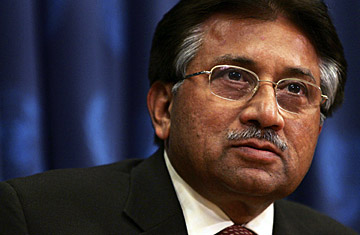
Pakistan President Pervez Musharraf at a news conference during the U.N. General Assembly in New York City, September 20, 2006
The text messages started arriving around midnight. They came with lists of names of opposition leaders and party workers aligned against Pakistan President General Pervez Musharraf. One by one they had been arrested and detained — some thrown in jail, others kept under house arrest. They were given 30-day detention orders and arrested for breach of public safety ordinances, though they had done nothing yet. "Has Mush gone Mad?" asked one instant message. "Let them do their worst," said another. "We will carry on."
This new round of arrests, following just two weeks after government forces slammed thousands of opposition party workers into jail before the arrival — and subsequent deportation — of former Pakistani Prime Minister Nawaz Sharif, is the latest sign of a government determined to hang on to power at all costs. "The government has panicked," says Ahsan Iqbal, Information Secretary for Sharif's PML(N) party, speaking from an underground safe house. "What are they trying to prove by bulldozing all opposition to their plans? Does anyone think this can be called a democracy?"
This week Musharraf, who overthrew Sharif in a bloodless coup eight years ago, plans to file nomination papers for another bid for the presidency, a five-year term that would keep a man the U.S. calls its best ally in the war on terror in power, but that also risks further destabilizing a nuclear-armed nation that is teetering on the edge of a militant Islamic insurgency. Elections will be held October 6 and will be conducted by an electoral college made up of the national and provincial assemblies.
Opposition parties hold that Musharraf's second bid for the presidency violates the country's constitution, a somewhat flimsy document that has been bent more times in the service of keeping military generals in power than preventing them from ascending. Officially, the document prohibits military officers from holding and running for civilian posts in the government until two years after retirement. But in 2002, Musharraf circumvented that constitutional clause with a one-term exemption that was legitimated by a then docile Supreme Court.
Musharraf's efforts to engineer a similar legal coup for his second term started to unravel last March when he attempted, and failed, to dismiss the increasingly independent supreme court Chief Justice Iftikhar Chaudhry. Since then his popularity, which was at record highs when he first took power from a Prime Minister widely seen as corrupt and out of touch, has plummeted to levels below that of Osama bin Laden (though still higher than U.S. President George W. Bush, according to a new poll). Last week, through his lawyer, Musharraf promised the Supreme Court that he would step down as chief of the army if he were elected. Many opposition politicians interpreted that as a threat: if he is not reelected, by whatever reason, be it a Supreme Court injunction, or a lack of quorum in Parliament brought about by a mass resignation, the declaration of martial law would be the next step.
As several Supreme Court cases concerning Musharraf's eligibility for another term continue into the second week of debate, analysts see this weekend's rash of arrests as signs of a government losing its grip. The Supreme Court could be turning against him, say some, or he no longer has the majority he needs to be reelected. "I think this is a sign of desperation" says Ayesha Tammy Haq, a prominent political talk show host. "Why else would you go and arrest a group of declawed politicians?" Or, she pauses, "it could also mean abject stupidity." Like Musharraf's attempts to unseat Chief Justice Chaudhry in order to smooth his way to continued power, "This is another incredibly stupid move that will backfire on the government. You are not winning friends by doing something like this. The masterminds are obviously mindless masters."
Across Pakistan political activists and observers started to worry as the SMS messages continued to arrive into the early hours of the morning. No rallies had been programmed for the coming days, but lawyers, who had been instrumental in restoring Chaudhry to power, had announced a backup plan were the Supreme Court to declare Musharraf's candidacy legal. Nomination papers must be filed in person at the Electoral Commission by the 27th of September, and lawyer's groups had called for mass protests to block Musharraf's papers from being filed . "Musharraf's opponents made an announcement that they would put the Election Commission offices under siege," explains Senator Nisar Memon, Chair of the Senate Standing Committee on Defense. For that reason, they were detained. "They were going to turn the Election Committee offices into a virtual prison, stopping people from going in, and stopping government workers from doing their job. That is against the law. That hurts other people's democratic right to file a nomination for President, and the government cannot allow that to happen."
A larger concern, suspects Iqbal, is a new plan by the All Parties Democratic Movement (APDM), an alliance of opposition parties, to collectively resign their parliamentary seats before the presidential vote takes place. "They are trying to sabotage our plan by putting all the party workers and leaders in jail until after the vote," he says. "The government thinks that will prevent us from making a political statement by walking out together. That would make the election look like a one-sided circus." In retaliation for the arrests, the APDM has called for more protests outside the Supreme Court on Monday. Pakistanis are waiting for the government's counter move. As political observers thumb messages across the nation listing rapidly changing plans of action, social calls have been suspended. The most common sign-off these days? "OK, let's catch up once the government changes."
